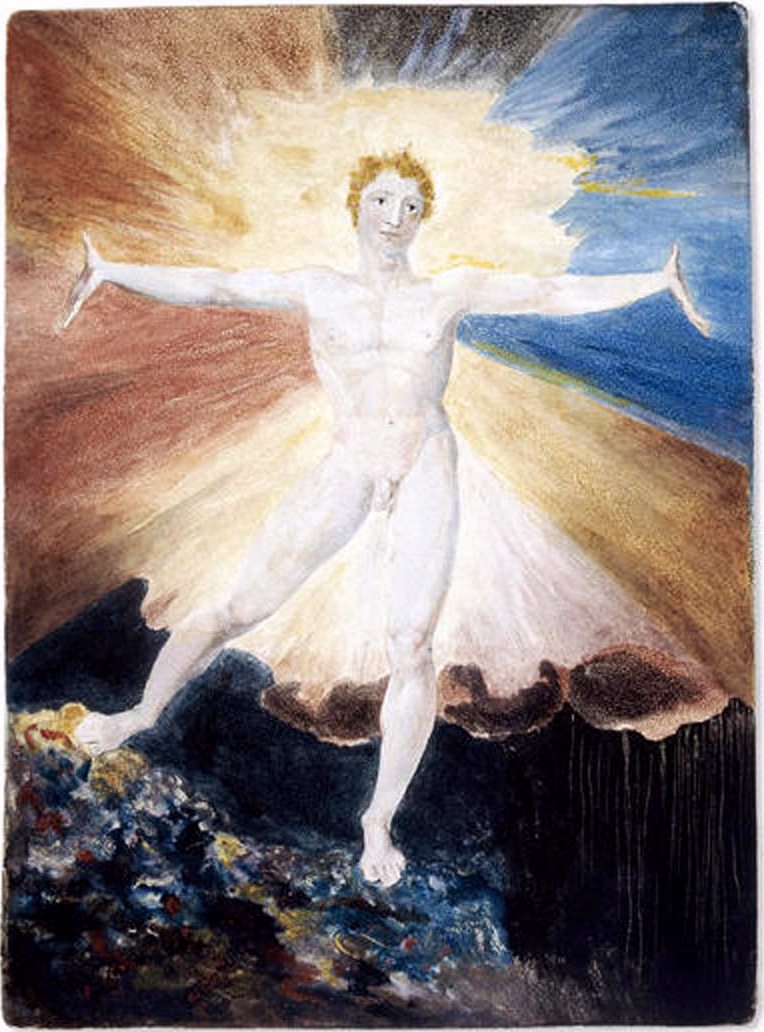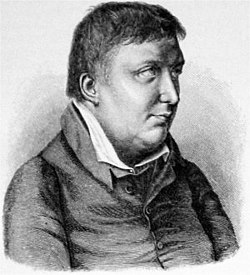 Myth: Myth and Literature (Friedrich Schlegel, Victor Hugo, Richard Wagner, William Blake, Nicolas Berdyaev)
Myth: Myth and Literature (Friedrich Schlegel, Victor Hugo, Richard Wagner, William Blake, Nicolas Berdyaev)_____
Friedrich Schlegel: Modern Mythology
Before the anthropologists and psychoanalysts revived an interest in myth, the impetus for its study came from Romantics like Schlegel, whose "Dialogue on Poetry" (1800) was a plea for reviving the mythic impulse as a defense against materialism and rationalism. Schlegel goes so far as to define a contemporary literary malaise:
But since we don't, he continues, we have to make one, "fashioned out of the profoundest depths of the spirit; it must be the most artificial of all works of art, for it is to encompass all others, it is to be a new course or a vessel for the ancient, eternal fountainhead of poetry and itself the everlasting Poem which contains within itself the seeds of all other poems."It is my contention that our poetry lacks a center, such as mythology was for the ancients, and the essential shortcomings of modern poetry may be summed up in these words: we have no mythology.
Friedrich Schlegel, date unknown
For Schlegel, a working myth is a cultural sine qua non, and he hopes to find impetus for it "in the great phenomenon of the age - in idealism! -- a very significant hint and a notable manifestation of what we are seeking." If we fail to do so, he argues, the results could be catastrophic: "mankind is struggling with all its might to find its center. Mankind must, as matters stand, go under or rejuvenate itself." But he is optimistic, because, he says, this is "an age of rejuvenation."
Nature, for a Romantic like Schlegel, is the source of this new mythology, which will be "a hieroglyphic expression of surrounding nature in a transfiguration of imagination and love." We must "suspend the course and laws of logically reasoning thought," in order to be transported "back to the fine confusion of the imagination, the original chaos of human nature" -- in other words, listen to what the unconscious is telling us.
All thought is divination, but man is only just beginning to become aware of his powers of divination. What immeasurable expansions will men yet experience, and even at this very time! In my estimation, whoever understands the epoch, which is to say the great process of general rejuvenation and the principles of perpetual revolution, should be able to grasp both poles of humanity, to understand the deeds of the earliest men and to know the character of the golden age that is yet to come.
Victor Hugo: Imaginative Types
 |
| Victor Hugo, date unknown |
Shylock, whom Hugo erroneously calls "that fierce merchant of Venice" (the merchant of the play's title is Antonio), "is the embodiment of Jewishness; he is also Judaism." That is, he's the individuation of a type. Repellent as this kind of stereotyping is to us today, it coheres with Hugo's theory that literature proceeds from prototype to individual, and that the individual figure in literature succeeds in large part because he encompasses all other individuations of the type: "that is to say, [Shylock's] whole nation, the high as well as the low, faith as well as fraud; and it is because he sums up a whole race, such as oppression has made it, that Shylock is great. The Jews are, however, right in saying that none of them -- not even the medieval Jew -- is Shylock." He uses as analogy an orange tree: A leaf from the tree doesn't taste like the fruit, "yet there is a deep affinity, an identity of roots, a sap rising from the same source, a sharing of the same subterranean shadow before life. The Fruit contains the mystery of the tree, and the type contains the mystery of the man. Hence the strange vitality of the type."
If the type were "but an abstraction, men would not recognize it, and would allow this shadow to go away." Although Hugo doesn't mean by "shadow" the same thing Jung does, he is verging on something Jungian, a theory of archetypes, here. "Types are cases foreseen of God; genius realizes them.... God creates the phenomenon, genius gives it a name; God creates the miser only, genius forms Harpagon; God creates the traitor only, genius makes Iago," and so on. And literature in turn creates types, just as God created Adam: "The man of Homer, Achilles, is an Adam: from him comes the species of the slayers; the man of Aeschylus, Prometheus, is an Adam: from him comes the race of the wrestlers; the man of Shakespeare, Hamlet, is an Adam: to him belongs the family of the dreamers."
Richard Wagner: The Folk and the Myth
Hitler co-opted Wagner, as well as the concept of das Volk, literally, "the people," but with racial (not to say racist) overtones. These two excerpts, one from "The Art-Work of the Future" (1849), the other from "Opera and Drama" (1875), are muddled a little by having two different translators, each of whom fiddles uneasily with finding the right word to translate das Volk. The first excerpt, in fact, makes things more confusing by sometimes translating the word "the Folk," and sometimes "the People." (A quick check of the original shows that Wagner used das Volk in both instances.) In any case, Wagner observes, the word "has acquired an ineradicable moral" meaning -- long before Hitler proclaimed "ein Volk, ein Reich, ein Führer."
But to get to Wagner himself, he asserts, "The 'Folk' is the epitome of all those men who feel a common and collective Want," some ultimate unfulfilled need toward which they are driven. He is working here toward a version of the Jungian collective unconscious. First "the human poetic faculty" comes up with gods, which he posits as a kind of nature-myth, in which "man represents to himself the essence of natural manifestations as derived from a Cause." And the gods naturally take human form: "he must present his God not only in a shape most suitable to be apprehended by his purely human intuition but also outwardly the most intelligible."
All understanding comes to us from Love; and the natural impulse of man is toward the being of his own species. Just as the human from is to him the most intelligible, so also will the qualities of natural manifestations -- which he does not yet know in their reality -- be rendered most intelligible to him by being reduced to human shape.In other words, humankind creates God in its own image. It anthropomorphizes nature. Thus arises myth and, through it, art, "for these shapes must necessarily win artistic form and content, if, as is their peculiarity, they really spring from man's longing that the representation of manifestations should be thoroughly intelligible."
Art, by the very meaning of the term, is nothing else than fulfillment of the desire to recognise oneself in an admired or beloved object, to find oneself again in the manifestations of the outer world, as controlled by their representation.... Thus Greek tragedy is nothing but the artistic fufillment of the Myth itself; just as the Myth had been the poetic expression of that life-view common to all.
William Blake: Visionary History
Blake's "A Descriptive Catalogue of Pictures" is a guide to the works he exhibited in 1809, many of which were on historical themes, including the now lost "The Ancient Britons," which depicted a battle between King Arthur and the Romans. In this excerpt, Blake discusses the personifications of Strength, Beauty and Ugliness:
The Strong Man represents the human sublime. The Beautiful Man represents the human pathetic, which was in the wars of Eden divided into male and female. The Ugly Man represents the human reason. They were originally one man, who was fourfold; he was self-divided, and his real humanity slain on the stems of generation, and the form of the fourth was like the Son of God.Blake is working toward a myth of history here, and as a Briton he naturally gravitates toward the myth of King Arthur, who is a kind of avatar of Blake's Albion:
 |
| William Blake, Albion Rose, 1794-95 |
The giant Albion, was Patriarch of the the Atlantic; he is the Atlas of the Greeks, one of those the Greeks called Titans. The stories of Arthur are the acts of Albion, applied to a Prince of the fifth century, who conquered Europe, and held the Empire of the world in the dark age, which the Romans never again recovered.Blake's mythology is, frankly, as mind-numbing to follow as Yeats's theory of history with its gyres and cones. But here what he's proclaiming is a connection with the historical past that has been lost in part because of the emergence of rationalism. "The antiquities of every Nation under Heaven, is no less sacred than that of the Jews," he asserts.
The reasoning historian, turner and twister of causes and consequences, such as Hume, Gibbon, and Voltaire, cannot with all their artifice turn or twist one fact or disarrange self evident action and reality. Reasons and opinions concerning acts are not history. Acts themselves alone are history, and these are neither the exclusive property of Hume, Gibbon, nor Voltaire.... All that is not action is not worth reading.... His opinions, who does not see spiritual agency, is not worth any man's reading; he who rejects a fact because it is improbable, must reject all History and retain doubts only.
Nicolas Berdyaev: Myth as Memory
"Myth is no fiction, but a reality," Berdyaev says in The Meaning of History (1923). "All great historical epochs, even those of modern history with their tendency to discredit mythology, give rise to myths." The individual human being is "a sort of microcosm in which the whole world of reality and all the great historical epochs combine and coexist." And in order to maintain some integrity of personality, of self-awareness, the individual must come to terms with this fact. Berdyaev, too, verges on the Jungian:
Only deep down in his own self can man really discover the secrets of time; for these, far from being something superficial and alien, something imposed and forced upon him from without, represent on the contrary the deepest and most mysterious strata implicit in himself. A narrow consciousness would either disregard these strata or relegate them to a secondary plane.Like Blake, Berdyaev finds the rationalist, analytical approach to history wanting: "The divorce of the subject from object as the result of enlightened criticism may provide material for historical knowledge, but in so far as it destroys the myth and dissociates the depths of time from those of man, it only serves to divorce man from history." But unlike Blake, he is willing to grant it some value, as long as it makes room for the social function of tradition and for the role of religion:
Tradition is synonymous with the knowledge of historical life; for its symbolism reveals the inner life and the profound organic union of historical reality with that which man discovers his own spiritual self-knowledge.... I am therefore inclined to believe that the mysteries of the divine as well as of the human and world life, with all their complexity of historical destiny, admit of solution only through concrete mythology. The knowledge of the divine life is not attainable by means of abstract philosophical thought based upon the principles of formalist or rationalistic logic, but only by means of a concrete myth which conceives the divine life as a passionate destiny of concrete and active persons....For Berdyaev, the myth, which includes the "drama of love and freedom" of Christianity, is the only way to comprehend "the destinies of both man and the world."

No comments:
Post a Comment